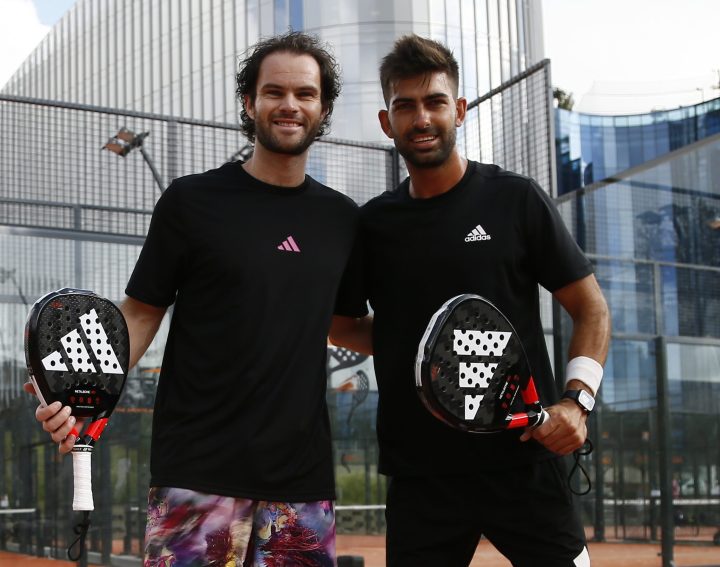SMASHING SUCCESS
The padel craze – a mix of tennis and squash that’s taking South Africa by storm

The racquet game now has an estimated 25 million-plus active players worldwide and its own professional circuit. And since arriving in South Africa in late 2020, the growth has been exponential.
The roots of padel are found in Acapulco, Mexico, in 1969, when a businessman, Enrique Corcuera, adapted his home squash court to integrate elements of platform tennis, which is essentially a slightly edited, smaller version of tennis that can be played year-round.
Playing on the new court, Corcuera created something he called Paddle Corcuera.
As the story goes, Corcuera would invite friends over to play his newly invented game. One of them, Alfonso of Hohenlohe-Langenburg, a Spanish prince, was so inspired that he decided to build two courts of his own in his home town of Marbella, Spain, in 1974.
Half a century on, padel, as it is now known, is played by more than 25 million people worldwide, and is recognised as one of the world’s fastest-growing sports.
What is padel?
James Baber, the CEO of Africa Padel, currently the largest padel company in South Africa in terms of the number of courts and locations, describes padel as “a mixture of tennis and squash played on a substantially smaller court”. Padel courts are generally one-third of the size of a tennis court and are enclosed with glass panels and metallic fencing.
Padel is typically more of a flowing game than tennis, and the rallies are generally longer, says Baber. Additionally, the required level to play and enjoy padel is a lot lower than tennis, he says.
“I think if you play tennis, the person or people you play with or against need to be of a pretty similar level otherwise it’s not much fun at all. With padel, on the other hand, you can have a more varied skill set and still have a hell of a lot of fun.”
An attractive feature of padel is that it’s fairly quick to play, says Baber.
“People who play a lot will generally play for an hour and a half, although a lot of people do play for an hour. So you’re kind of in and out.”
The sport also has a very social aspect to it, he says.
“If we take an afternoon game where someone’s playing from 5pm to 6.30pm, they will generally get there a couple of minutes before and have a bit of banter, and then afterwards sit down and have a cup of coffee or a couple of beers. There are lots of leagues being organised, lots of tournaments being organised… So, there’s a huge focus on the social side.”
Playing the game
Padel is predominantly played in a doubles format and shares many of the same rules as tennis, such as serving into designated blocks each point, the let rule and the points system. However, like squash, players are allowed to hit the ball against the glass panels and metallic fences surrounding the court.
Matches typically consist of best-of-three sets and can be played in time slots of either one hour or an hour and a half. At the majority of courts in South Africa (and many worldwide), matches are booked via the Playtomic app.
Read in Daily Maverick: “Sport remains a powerful game-changer in South Africa’s unequal society”
“Playtomic is a global app. It’s a Spanish company. We believe that they have about two to three million active users globally. We [Africa Padel] were the first company in South Africa to start using Playtomic as our booking system. And the majority of our competitors also use Playtomic, which we believe is a good thing,” says Baber.
“It makes it easier for players because you only have to register once and put your details and your credit card in, and you can book at multiple clubs across the country, unless obviously a club isn’t on Playtomic.”
When booking on the app, players are shown nearby padel courts as well as the various time slots available at these courts on different days. If a booking is made, the prescribed fee for the court and any extras, such as racquet rentals, will be charged to the debit/credit card added on the player’s account.
“A court is generally in the region of R400 to R500 per hour. But you can split that between the four people who are playing. So, it’s basically somewhere between R100 and R125 per person per hour,” Baber explains. With the Africa Padel membership programme, players can get a 25% discount on this fee, he says.
In terms of the equipment needed to play the sport, players need a padel racquet, which has perforations, no strings and a short grip with a rope at the end that attaches to the player’s wrist.
Racquets can either be rented for R50 per match on Playtomic, or bought online or in selected retail stores.
“An entry-level racquet will cost you in the region of R2,000, while a top-of-the-range racquet will cost you about R7,000. In our experience, certainly in the Cape Town market and the Joburg market, most people are spending between R3,000 and R5,000 on a racquet,” says Baber.
Padel balls are very similar to tennis balls, but are slightly smaller and bounce less. They are provided free when booking matches on Playtomic.
“There is a perception that it’s not a cheap sport. But I guess if you’re comparing it to cycling or golf or any of those then it’s not ridiculously expensive,” he says.
Local growth
Padel first arrived in South Africa in late 2020 when Katherine Hartmann and Brit King, the co-owners of Action Padel SA, opened two courts among the five-a-side soccer pitches just outside Canal Walk in Cape Town.
More courts soon followed in Clearwater Crossing in Roodepoort, and Africa Padel opened its first court at the Camps Bay Rotunda in May 2021. It costs between R800,000 and R1-million to build a court, but many have already been paid off.
“We have fairly regular regional updates with Playtomic, and as at the end of December 2022 there were around 176 courts in South Africa,” says Baber.
In terms of the exact number of people playing padel nationwide, he estimates it to be in the hundred thousands.
Spain is the padel hotspot of the world, with an estimated six million active players and more than 20,000 courts across the country.
“The growth has been phenomenal. And we believe that it will keep growing. We believe that the capacity of courts in South Africa, and this is just our opinion, is probably in the region of 500 to 600 courts.”
Most padel courts in South Africa are in various suburbs of Johannesburg and Cape Town, but there are also courts in Benoni, Krugersdorp, Pretoria, Kimberley, Durban, Umhlanga, East London, George, Plettenberg Bay and Somerset West.
Courts are also opening soon in Gqeberha, Knysna and Ballito, among other places. DM168
This story first appeared in our weekly Daily Maverick 168 newspaper, which is available countrywide for R25.




















Comments - Please login in order to comment.